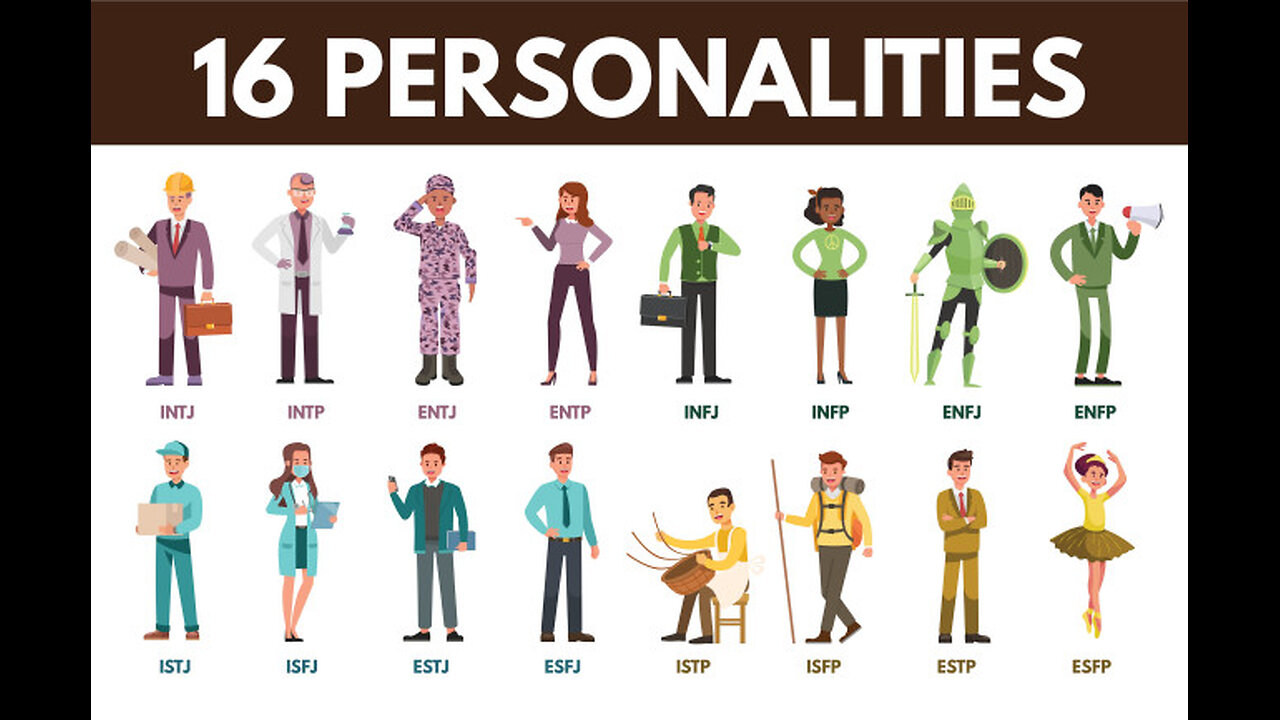Premium Only Content

✨What's 𝓨𝓞𝓤𝓡 Personality Type ? ✨
Free Assessment - https://www.16personalities.com/free-personality-test
Free Amazon Kindle Book - https://amzn.to/3UE8XSG
Have you ever heard someone describe themselves as an INTJ or an ESTP and wondered what those cryptic-sounding letters could mean? What these people are referring to is their personality type based on the Myers-Briggs Type Indicator (MBTI).
Through a series of questions, the MBTI assessment helps you identify your natural preferences in four areas of personality:
An Overview of the Test
The goal of the MBTI is to allow respondents to further explore and understand their own personalities including their likes, dislikes, strengths, weaknesses, possible career preferences, and compatibility with other people.
No one personality type is "best" or "better" than another. It isn't a tool designed to look for dysfunction or abnormality. Instead, its goal is simply to help you learn more about yourself. The questionnaire itself is made up of four different scales.
Extraversion (E) – Introversion (I)
The extraversion-introversion dichotomy was first explored by Jung in his theory of personality types as a way to describe how people respond and interact with the world around them. While these terms are familiar to most people, the way in which they are used in the MBTI differs somewhat from their popular usage.
Extraverts (also often spelled extroverts) are "outward-turning" and tend to be action-oriented, enjoy more frequent social interaction, and feel energized after spending time with other people. Introverts are "inward-turning" and tend to be thought-oriented, enjoy deep and meaningful social interactions, and feel recharged after spending time alone.
We all exhibit extraversion and introversion to some degree, but most of us tend to have an overall preference for one or the other.
Sensing (S) – Intuition (N)
This scale involves looking at how people gather information from the world around them. Just like with extraversion and introversion, all people spend some time sensing and intuiting depending on the situation. According to the MBTI, people tend to be dominant in one area or the other.
People who prefer sensing tend to pay a great deal of attention to reality, particularly to what they can learn from their own senses. They tend to focus on facts and details and enjoy getting hands-on experience. Those who prefer intuition pay more attention to things like patterns and impressions. They enjoy thinking about possibilities, imagining the future, and abstract theories.
Thinking (T) – Feeling (F)
This scale focuses on how people make decisions based on the information that they gathered from their sensing or intuition functions. People who prefer thinking place a greater emphasis on facts and objective data.
They tend to be consistent, logical, and impersonal when weighing a decision. Those who prefer feeling are more likely to consider people and emotions when arriving at a conclusion.
Judging (J) – Perceiving (P)
The final scale involves how people tend to deal with the outside world. Those who lean toward judging prefer structure and firm decisions. People who lean toward perceiving are more open, flexible, and adaptable. These two tendencies interact with the other scales.
Each type is then listed by its four-letter code:
ISTJ - The Inspector: Reserved and practical, they tend to be loyal, orderly, and traditional.
ISTP - The Crafter: Highly independent, they enjoy new experiences that provide first-hand learning.
ISFJ - The Protector: Warm-hearted and dedicated, they are always ready to protect the people they care about.
ISFP - The Artist: Easy-going and flexible, they tend to be reserved and artistic.
INFJ - The Advocate: Creative and analytical, they are considered one of the rarest Myers-Briggs types.3
INFP - The Mediator: Idealistic with high values, they strive to make the world a better place.
INTJ - The Architect: High logical, they are both very creative and analytical.4
INTP - The Thinker: Quiet and introverted, they are known for having a rich inner world.
ESTP - The Persuader: Out-going and dramatic, they enjoy spending time with others and focusing on the here-and-now.
ESTJ - The Director: Assertive and rule-oriented, they have high principles and a tendency to take charge.
ESFP - The Performer: Outgoing and spontaneous, they enjoy taking center stage.
ESFJ - The Caregiver: Soft-hearted and outgoing, they tend to believe the best about other people.
ENFP - The Champion: Charismatic and energetic, they enjoy situations where they can put their creativity to work.
ENFJ - The Giver: Loyal and sensitive, they are known for being understanding and generous.
ENTP - The Debater: Highly inventive, they love being surrounded by ideas and tend to start many projects (but may struggle to finish them).
ENTJ - The Commander: Outspoken and confident, they are great at making plans and organizing projects.
-
 LIVE
LIVE
MissesMaam
8 hours agoRumblers Stranded Again! | Sons of the Forest 💚✨
688 watching -
 16:03
16:03
DeVory Darkins
1 day ago $20.04 earned"Shut The F**K UP!" Charles Barkley EXPLODES As DEMS MELTDOWN over Trump
47K245 -
 4:44:04
4:44:04
Akademiks
10 hours agoDiddy is RUNNING The Jail! Feds Fear He's Unstoppable even behind Bars! Drake Revenge Era?
87.8K12 -
 5:26:52
5:26:52
Fed Reacts
8 hours agoReaction To Twitch Adpocolypse, Thots, Debating Blacks & Liberals!
55.1K10 -
 2:12:41
2:12:41
TheSaltyCracker
11 hours agoMSM Implodes After Trump Win ReeEEeE Stream 11-17-24
212K441 -
 4:31
4:31
SLS - Street League Skateboarding
10 days agoFuna Nakayama 3rd Place at SLS Sydney 2024 | Best Tricks
66.3K7 -
 2:15:24
2:15:24
vivafrei
20 hours agoEp. 236: BARNES IS BACK! Election Recap! Trump Nominees! Trump Persecutions - Wha's Next? & MORE!
251K260 -
 6:25:47
6:25:47
SynthTrax & DJ Cheezus Livestreams
19 hours agoDJ Cheezus & DEF JAM Fight for NY on PS2 - Hip Hop Violence and Vibes (1pm PST / 4pm EST)
101K4 -
 2:01:47
2:01:47
Nerdrotic
14 hours ago $14.39 earnedEgypt, Peru and Guatemala Luke Caverns RETURNS! | Forbidden Frontier #082
86.1K10 -
 LIVE
LIVE
Vigilant News Network
14 hours agoFDA Approves Trials for New “Pandemic” Vaccine | Media Blackout
1,992 watching